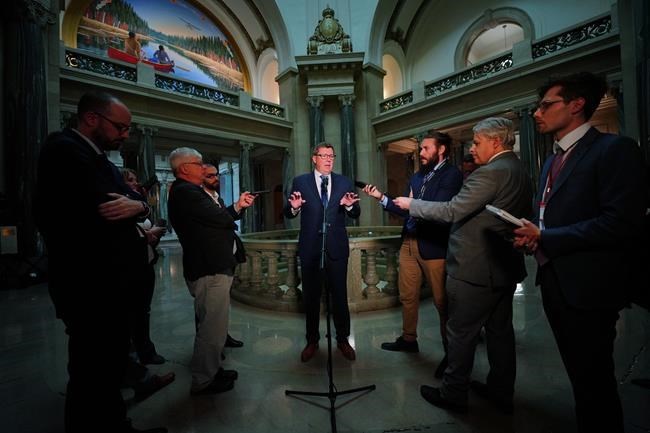REGINA — The Saskatchewan government has invoked the notwithstanding clause of the Constitution in tabling legislation that prevents children under 16 from changing their names or pronouns at school without parental consent.
The proposed legislation would enforce a policy announced in August. Lawyers for UR Pride, an organization representing LGBTQ people in Regina, sought an injunction of the policy, arguing it could cause teachers to out or misgender children, violating the Charter of Rights and Freedoms.
Court of King's Bench Justice Michael Megaw ordered the injunction until a constitutional challenge can be heard in court later this year, a decision Premier Scoot Moe called "judicial overreach."
Here is a look at the rarely used clause:
WHAT IS IT?
The notwithstanding clause — or Section 33 of the Charter — gives provincial legislatures or Parliament the ability, through the passage of a law, to override certain portions of the Charter for a five-year term.
ITS ORIGINS
The clause in its current form came about as a tool to bring provinces onside with then-prime minister Pierre Trudeau's signature piece of legislation. With Charter negotiations ramping up in the early 1980s, Trudeau didn't see the need for the clause, but provinces including Alberta and Saskatchewan, wanted an out should they disagree with a decision of the courts. In the end, Trudeau reluctantly agreed.
ITS STRUCTURE
The clause only applies to certain sections of the Charter. For instance, it can't be used against provisions that protect the democratic process — that would create a pathway to dictatorship. The clause also can't be used for more than five years at a time. This ensures that the public has the chance to challenge a government's decision to use the clause in a general election before it can be renewed.
ITS USE
The clause usually comes up whenever there is a controversial court ruling. For example, former prime minister Stephen Harper's Conservatives were asked about, but refused to use, the clause on a court decision involving assisted dying. While often debated, its use is much rarer. Quebec, as the only provincial government to oppose the Charter, passed legislation in 1982 that invoked the clause in every new law, but that stopped in 1985. In 1986, Saskatchewan used the clause to protect back-to-work legislation and Quebec used it again in 1988 to protect residents and businesses using French-only signs. Alberta tried to use the clause in a 2000 bill limiting marriage to a man and a woman, but that failed because marriage was ruled a federal jurisdiction.
RECENT NOTABLE USES
Last year, the Ontario government invoked the notwithstanding clause to pass legislation imposing contracts on approximately 55,000 education workers in the province — including librarians, custodians and early childhood educators — and ban them from going on strike.
In 2021, Ontario's Progressive Conservative government used the clause to restore parts of the Election Finances Act that had been declared unconstitutional. It means third parties can only spend $600,000 in the 12 months before an election is called.
Quebec proactively used the clause when it passed a major reform to its signature language law last year. The legislation reasserts the right of Quebecers to live and work in French, and toughens sign laws and language requirements for businesses, governments and schools.
Quebec also pre-emptively used the clause in passing its religious symbols law. Adopted in 2019, it prohibits public sector workers who are deemed to be in positions of authority, including teachers, police officers and judges, from wearing religious symbols such as hijabs and turbans on the job.
___
This report by The Canadian Press was first published Oct. 12, 2023.
The Canadian Press



